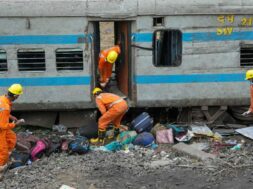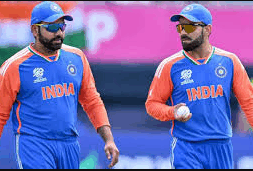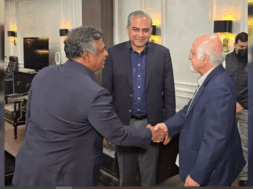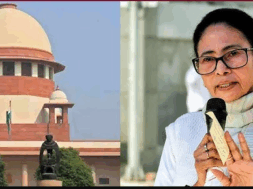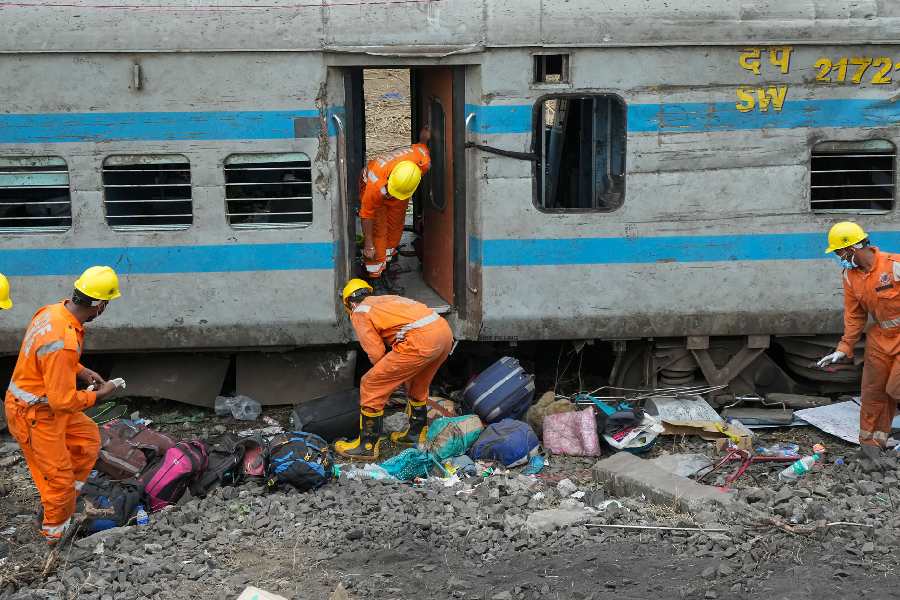
Manas Dasgupta
NEW DELHI, June 5: Even as the National Disaster Response Force (NDRF) on Monday ended its rescue operation and withdrew all its nine teams from the triple train accident site in Balasore in Odisha that has claimed at least 275 lives, the loco pilot and co-pilot of Chennai-bound Coromandel Express are recuperating in a hospital in Bhubaneswar.
The Coromandel Express’ loco pilot G.N. Mohanty, is deemed to be critical and is in the Intensive Care Unit of the privately-run AMRI hospital in Bhubaneswar while his co-pilot Hazari Behera, who has fractured his leg and suffered multiple abrasions, is also getting treatment in the same hospital, conscious but still very weak and disoriented.
The NDRF before completing its task rescued 44 victims and retrieved 121 bodies from the spot since the teams were deployed after the accident on June 2, they said. The operation has ended and all nine teams have now been withdrawn as there are no live or dead victims present at the accident site near the Bahanaga Bazar Railway Station. Eight teams were relieved on Sunday, while one was drawn out on Monday, they said.
The nine teams had joined the personnel of state disaster forces and the local administration to undertake rescue and relief operations after they were sent in from Balasore, Mundali (Cuttack district) and Kolkata. The NDRF rescuers carried heavy plasma and gas cutters, lifting pads, stretchers, canine teams and other equipment to undertake the operation.
The Shalimar-Chennai Central Coromandel Express entered the wrong track and hit a stationary goods train on Friday. Its coaches got scattered all around, including on an adjoining track and another passenger train — Bengaluru-Howrah Superfast Express — coming at a high speed rammed into them and derailed.
Though some of the injured blamed the pilot and co-pilot, the railway officials have exonerated them of any fault. Hazari Behera, the 36-year-old assistant loco pilot who was helming the Coromandel Express, escaped from the jaws of death when his train hit the stationary goods train from behind at the loop line.
The pilot’s family was distressed that local media has been running fake news about his alleged death. “Media doesn’t realise the toll that such false reports can take on the family of the injured. Especially when my husband is still weak and unable to sit straight,” Behera’s wife said.
Behera’s family pleaded with the media to respect their privacy, especially given that a few of the injured have allegedly blamed the loco pilot and his assistant for the collision.
A senior railway official said the loco pilot’s duties involve starting, stopping and accelerating the train. “There is no way that at a high speed of 128 kilometres per hour, that too in the dead of the night, the loco pilot would have noticed that it was going to collide with a goods train, especially when he had received a green signal to proceed on the main line,” the official said.
In an ideal situation, the signal is supposed to turn green simultaneously with the switching that ensures that the train runs on the right track. This operation is remotely controlled from the section office which includes the signalmen, section officers, section head and station master. “The loco pilot has no control over this,” the official said, adding that the first person eyewitness accounts of the loco pilot and his assistant loco pilot would be crucial to the inquiry.
Of the 1,116 patients received in hospitals, up to 172 were released after treatment, 390 were referred and another 495 are currently undergoing treatment in government facilities primarily in Balasore, Gopalpur, Soro, Bhadrak and Cuttack.
Of the 275 bodies that were removed from the accident site, nearly 140 lay in the mortuaries of different health facilities in Bhubaneswar, with at least 114 bodies lying at the All India Institute of Medical Sciences in the city. “We are conducting DNA sampling of each body and then undertaking a process of embalming to later hand them over to the relatives. Our doctors are involved in this process around the clock,” AIIMS director Ashutosh Biswas said.
The Odisha train tragedy, however, has exposed the failings in the functioning of Indian Railways of neglecting the critical signal and telecommunications wing even when new technology is being introduced for upgrading infrastructure like modern trains and machinery to maintain or lay tracks, overhead traction, increasing speeds and so on.
“The mishap has put the spotlight on the human resource deployment problem, especially in the telecommunications-signalling wing. At the ground level it is saddled with semi-skilled workers promoted from linemen towards handling mechanical or sophisticated electronic systems,” explained senior railway officials. These ground level staff simply do not have the personality to stand up to pressures from the traffic or civil engineering wings breathing down their neck to complete his work – maintenance or inspection or repairs – as it could mean delay in running time of the express trains.
Problem is quite acute at the wayside stations – where express trains are supposed to breeze through without halting. “Railways has started outsourcing certain works including maintenance of new telecom-signal equipment by the companies concerned. These firms deploy badly trained and lowly paid technical personnel including fresh engineering graduates with no motivation to work in such places,” reveal senior officials.
Even among railway engineers “nobody is willing to work” in remote places with bare amenities and boxed into small quarters. “We need to think of recruiting highly qualified engineers from good institutes with better pay, continuous training programmes and counselling to ensure safety continues to be of paramount importance for the railways,” they affirm.
The issue is also of inter-department rivalry despite unified managed structure in vogue now. “Derailments should not happen. Railways being a government monopoly has no incentive for performance. Instead of making top heads roll, there are hiding behind a sabotage theory of inter-locking signal system being tampered to cover up for the system failure,” attest senior officials.
When so much money is being poured into railways sans changing the basic character the government could consider going for something on the lines of the proven European Train Control System (ETCS), similar to CBTC -Communication Based Train Control System, used in metro rails across the country where human interference is bare-minimum, officials said.
